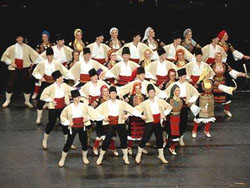The rhythm was born out of the dancers' steps, their cries and even their gold necklaces. With that rhythm, they told a folk tale.
On Feb. 11, the Serbian National Ensemble Kolo folk dancers performed at the National Olympic Memorial Youth Center in Tokyo. While the rhythm came through unusual means, the story behind the steps was what really succeeded in delighting the audience.
Kolo started its Japan tour on Feb. 6 and will continue performing across Japan until the final show in Tokyo on March 15.
Established in 1948, the troupe has weathered tragic conflicts in the Balkans following the breakup of the former Yugoslavia. Therefore, the complex history of this region has added variety to Kolo's menu as the ensemble has incorporated the dances of ethnic minorities from the area to their traditional repertoire of Serb dances.
Directed by Radojica Kuzmanovic, Kolo has prepared two programs. One of the programs includes a performance from the former Yugoslavia, such as a dance performed without accompanied music in Glamoc, a town in Bosnia and Herzegovina. It expresses the custom of young men testing a woman's healthiness and character to see if they are suitable for marriage. In the other program, Kolo performs dances related to religious festivals and ceremonies, such as the dance "Dubocke Kraljice" from the northern part of eastern Serbia. This is the dance of the Vlachs, an ethnic minority. It expresses a religious ceremony in which an exorcist tries to cure a queen who is possessed by an evil spirit.
Each program also has performances of folk music using traditional instruments from the region.
Depending on where you see the show, the program will be different. So, you can enjoy a variety of performances if you see the show in different locales.
Kolo will perform in the following cities: Feb. 27 in Yamaguchi; Feb. 28 in Takatsuki; March 1 in Nagoya; March 2 in Kagamihara; March 3 in Hamamatsu; March 5 in Maebashi; March 6 in Okegawa; March 7 in Matsumoto; March 8 in Kamakura; March 10 in Utsunomiya; March 11 in Sendai; March 12 in Yamagata; March 13 in Fukushima; and March 14-15 in Tokyo (March 14 is a demonstration event). Tickets cost ¥4,800 and are available via the Internet. For more information, visit www.folklor.com




